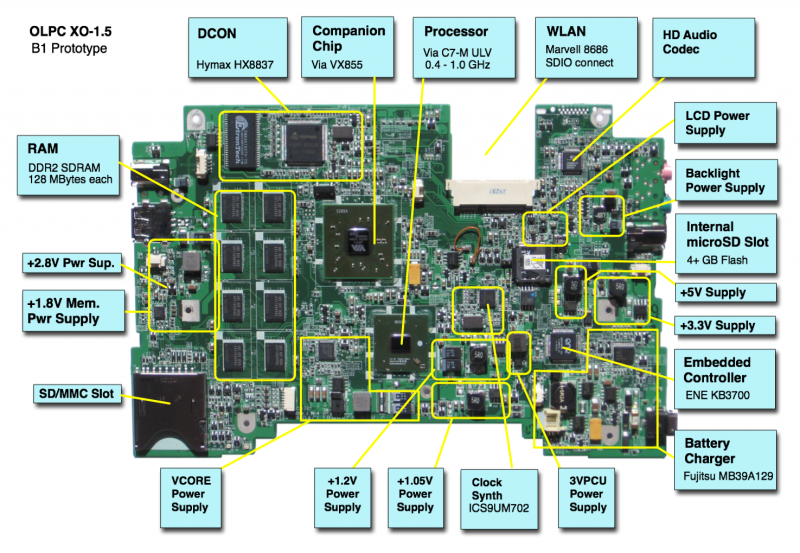XO 1.5 B2
XO-1.5 Laptop Beta test model 2 (B-Test 2), also known as B2.
Description
The B2 prototypes were complete systems, externally appearing very similar to production XO-1s (CL1A). OLPC received a couple hundred of these in September, 2009. If you have a pre-production version of an XO-1.5, chances are it is a B2 version.
The B2 version, aside from problems starting up at cold temperatures, and an inability to maintain wireless across suspend/resume, function relatively well and are representative of XO-1.5 production laptops.
Identification
- Identical externally to a production XO-1 with the single touchpad (CL1A).
- A label in the battery compartment says B-TEST, and the serial number starts with SHC9370.
- The motherboard has a daughtercard for the WLAN.
- The motherboard has an internal SD slot
- The motherboard is revision D
Photographs:
Software Support
Firmware
XO-1.5 use Q3xxx firmware releases. These will not work on an XO-1.
Obtaining Firmware
B2 motherboards require a release equal to or later than Q3A10. We currently suggest using Q3A36. There is no current firmware release for B2. Current XO-1.5 firmware releases are not tested on B2.
Check the XO 1.5 EC dev changelog for information about the latest EC firmware (integrated into the above OFW releases).
Upgrading Firmware
See upgrading firmware.
Linux
See release notes.
Hardware Limitations
The currently known hardware problems are:
Boot Problems at Cold temperatures
The B2 prototypes do not boot reliably at cold temperatures. This varies on a unit/unit basis, and was fixed by the C2 version. One way to quickly warm up a unit is to charge its battery.
Lid switch
The lid switch is flaky at best, completely non-operational (lid always closed) at worst. Tracked as #9911. This is fixed in versions of firmware later than Q3A25.
Power Draw
The B2 DC power input on B2s may reach 34W when running firmware earlier than Q3E15. With later firmware, the power draw is still 29W. There is an ECO which restores the laptop power to a 25W limit.
B2s also draw an inordinate amount of power (20mW) from the battery when turned off (and not plugged into a power source). This results in the battery life (with unit off) being rather short.
Overheating
The B2 prototypes have shown a tendency to overheat. We are working on a more respectable solution than simply throttling back the processor. In the meantime, be aware that the laptop may begin to function erratically if it gets too hot. This usually manifests itself as problems reading/writing the internal SD card.
Versions of firmware later than q3a13 should automatically throttle the processor in case of overheating. Please let us know if you experience overheating problems running newer firmware.
The more permanent fix is to reduce power consumption in a few places and re-design the heat spreader to improve contact with the chips.
WLAN and suspend
Operation of the WLAN across a suspend/resume is not supported on an unmodified B2.
There is an engineering change order (ECO) available to correct this.
DCON Interrupts
Interrupts from the DCON aren't detected reliably on B2 or earlier prototypes. There is an ECO available
EC/Host Interrupts
Interrupts from the EC to the host are filtered through ACPI. There is an ECO available which simplifies this, and will be applied to later versions.
Serial Port
The processor serial port situation on XO-1.5 is not optimal, as it shares pins with the camera interface. There is a connector (J4) located on the upper left hand side of the motherboard for +3.3V RS-232 connection (see the pinout and the connector/jumper locations), but its use must be enabled using a jumper.
To use the serial port you will have to short pins 1 and 3 on the SERIAL ENABLE jumper (JP1). This is located right behind the processor serial port (see the XO-1.5 B2 connector locations). Be aware that there is a test pad located next to the jumper block that erroneously looks like the pin 1 indicator. Pins 1 and 3 are the two pins closest to the memory chips.
There is no need to disconnect the camera in order to use the serial port. However, any use of the camera while the serial port is enabled will generate constant spurious serial data and is not recommended.
If the SERIAL_ENABLE jumper is set, the camera in-use LED will remain lit. This will not be fixed (Trac ticket #9385).
LEDs
There are four LEDs located below the screen. From right to left, they are:
- The power indicator -- if blinking, indicates that the unit is suspended.
- The battery indicator -- used to indicate battery charge status.
- The storage indicator "(*)" -- currently not supported by software, this indicator should show when the system is accessing the internal storage.
- The WLAN indicator "!" -- This blinks when the WLAN is transferring packets.
Documentation
Supporting documentation for these boards are (in PDF):
